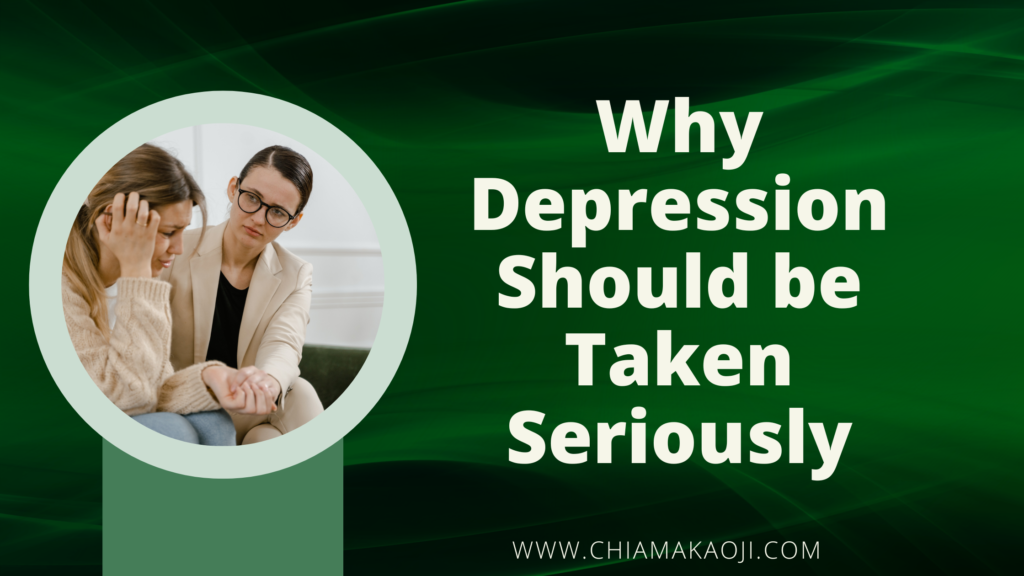Many people don’t understand depression.
They water it down with statements like: Just come out of your shell and enjoy your life with others and you’ll be fine. Have a positive outlook about life and stop thinking negatively. Why not simply forget about those things making you sad and try to be happy.
Or worse still, they blame you for not trusting God enough. “That’s the only reason you’re struggling with depression.”
With these statements, they trivialize the pit people battling Mental Health issues swim in. And make them feel it’s not something to be taken seriously. That’s why we have more and more people hiding, afraid and ashamed to own up… and seek help.
Depression is a serious mental health condition that affects millions of people worldwide. Despite its prevalence, many people still do not take depression seriously, often dismissing it as simply feeling sad or a sign of weakness. In this blog post, we will explore why depression should be taken seriously and the consequences of not doing so.
1. Depression can have a significant impact on a person’s quality of life.
People who are depressed may experience a loss of interest in activities they once enjoyed, changes in sleep and eating patterns, and difficulty concentrating or making decisions. This can lead to a decline in work or school performance, as well as social isolation. For example, a person who used to enjoy going out with friends may no longer find pleasure in social activities, and may start to withdraw from social interactions. Similarly, a student who used to get good grades may start to struggle with concentration and motivation, leading to a decline in academic performance.
2. Depression is a leading cause of disability worldwide.
According to the World Health Organization, depression is one of the leading causes of disability worldwide, responsible for an estimated $12 billion in lost productivity each year. This means that depression not only affects the person suffering from it, but also has a significant economic impact on society. For example, a person with depression may take more sick leave, have a harder time finding or keeping a job, or may be less productive while at work, all of which can contribute to lost productivity.
3. Depression can increase the risk of other health problems.
Studies have shown that people with depression are more likely to develop other health conditions, such as heart disease, diabetes, and stroke. Additionally, depression can worsen the symptoms of other conditions, such as chronic pain or asthma. For example, a person with depression may have a harder time managing their diabetes, leading to poor blood sugar control and increased risk of complications. Similarly, a person with depression may have a harder time managing their chronic pain, leading to increased disability and decreased quality of life.
4. Depression can lead to suicide.
Suicide is the 10th leading cause of death in the United States and 90% of people who die by suicide have an underlying mental health condition, such as depression. Suicide is preventable, and early identification and treatment of depression can help reduce the risk of suicide. For example, if a person is showing signs of depression and suicidal thoughts, it is important to intervene early with appropriate treatment, such as therapy and medication, to reduce the risk of suicide.
5. Depression can affect relationships and families.
People with depression may experience difficulty in their relationships, such as communication problems, lack of intimacy and conflicts. This can also affect their family members, as they may feel overwhelmed and stressed by caring for a loved one with depression. For example, a person with depression may have a harder time connecting with their spouse or children, and may withdraw from social interactions, leading to strain on their relationships.
In conclusion, depression is a serious mental health condition that should not be dismissed or ignored. It is a leading cause of disability and can lead to serious physical health problems, suicide and many other consequences. There are effective treatments available, and it is important for individuals to seek help and for society to reduce the stigma surrounding mental health. If you or someone you know is struggling with depression, please seek help from a mental health professional today.
